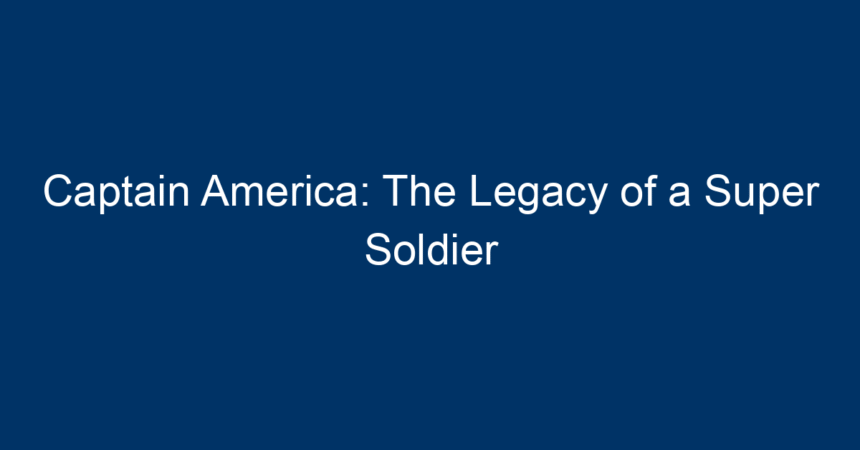Introduction
Captain America, a symbol of heroism and sacrifice, has been an enduring figure in popular culture since his creation in 1941. As a super soldier equipped with an indestructible shield and an unwavering moral compass, he has captivated audiences across generations. But what lies behind the iconic character of Captain America, and how has he shaped the superhero genre and the values of today? This article delves into the rich legacy of Captain America, exploring his origins, the evolution of his character, and his cultural significance in modern society.
The Origins of Captain America
The Birth of a Hero
Captain America was born during one of the most tumultuous times in American history—World War II. Created by writer Joe Simon and artist Jack Kirby, he first appeared in "Captain America Comics" #1. The character was designed as a patriotic supersoldier to inspire hope and enlistment during the war. Steve Rogers, a frail young man, undergoes an experimental procedure known as the Super Soldier Serum, transforming him into the physically superior Captain America.
The Symbol of Patriotism
From the outset, Captain America represented more than just physical strength; he embodied the values of patriotism, justice, and perseverance. His costume, featuring the American flag, resonated with a nation grappling with the horrors of war. He stood as a beacon of hope, rallying the public to support the war effort and symbolize the fight against tyranny.
The Evolution of Captain America through the Decades
The Golden Age: A Superhero for the War
In the early comics, Captain America battled Nazi forces and other world villains, portraying the fight between good and evil. The stories were simple, often filled with comic book tropes, but they served a greater purpose. Captain America’s unwavering resolve inspired soldiers and civilians alike, uniting them against a common enemy.
The Silver Age: A Depth to Character
As the world evolved, so did Captain America. The Silver Age of comics introduced complexity and depth to his character. Following the end of the war, Captain America found himself out of place in a rapidly changing America. Through storylines like “The Avengers” series, he was portrayed not only as a soldier but also as a leader wrestling with his ideals in a more nuanced world. This era marked Captain America’s transition from a straightforward patriotic figure to a more layered and relatable hero.
The Modern Era: A Reflection of Contemporary Issues
Today, Captain America is not just a superhero; he is a reflection of contemporary social issues. Series like “The Winter Soldier” and “Civil War” examine themes of trust, government accountability, and moral ambiguity. In these narratives, Captain America becomes a symbol of resistance against oppression, challenging the very government he once fought to protect.
Captain America’s Impact on Popular Culture
Film and Television Adaptations
The character’s transition to the big screen has played a significant role in solidifying his legacy. Beginning with the Marvel Cinematic Universe (MCU) films, Captain America has become a household name, portrayed masterfully by Chris Evans. The films explore key themes of liberty and justice while attracting a new generation of fans, ensuring the character’s relevance for decades to come.
A Cultural Icon
Captain America has also reached beyond comics and films. From merchandise to video games, his likeness and values resonate in various media. The phrase "I can do this all day" has become a cultural catchphrase, encapsulating his resilience. Furthermore, merchandise featuring his shield and logo remains popular, illustrating his status as a beloved icon.
The Philosophy of Captain America
Moral Integrity
Central to Captain America’s legacy is his moral integrity. He often grapples with ethical dilemmas, making choices that reflect his strong personal values. This moral compass serves as invaluable lessons for fans, showcasing the importance of standing up for one’s beliefs and fighting for justice, even in the most challenging circumstances.
Leadership and Sacrifice
Captain America’s role as a leader also delivers significant messages about teamwork and sacrifice. He often leads his fellow superheroes into battle, embodying the idea that true strength lies in unity. This lesson extends far beyond comic pages and movie screens, providing a model for leadership in various aspects of life—whether in personal relationships, community service, or workplace dynamics.
Future of Captain America
New Directions for New Generations
As the world changes, so too may the character of Captain America. Marvel has introduced new characters and narratives, such as Sam Wilson (the Falcon) taking on the mantle of Captain America. This evolution not only reflects the changing demographic of fans but also aligns with contemporary discussions around representation, inclusivity, and identity.
The Ongoing Legacy
The legacy of Captain America will undoubtedly endure. As long as there are struggles for justice and freedom, the essence of Captain America will live on. Future generations will continue to draw inspiration from his bravery, moral clarity, and resolve.
Conclusion
Captain America is more than just a comic book hero; he is a testament to the ideals of courage, sacrifice, and hope. From his humble origins as a super soldier battling tyranny to his modern portrayals that wrestle with complex social issues, his journey reflects the evolving values of society. As we continue to enjoy new narratives and adaptations, it’s essential to recognize the timeless lessons he embodies. The next time you see Captain America in action, remember not only the thrilling exploits but also the powerful legacy he represents.
Whether you’re a lifelong fan or a newcomer to the adventures of Captain America, there’s always room for his spirit of heroism in our lives. Stand up for what you believe in, lead by example, and never hesitate to fight for justice. After all, as Captain America reminds us, "I can do this all day."




